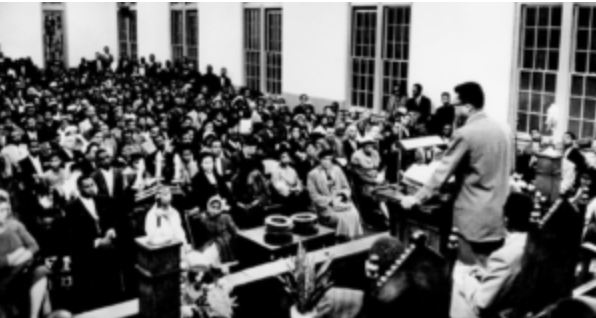60 Years Ago Today: The Lunch Counter Sit-Ins That Changed History
Citlalli Chávez-Nava and Vanessa Codilla | February 20, 2020
Today marks the 60th anniversary of the Nashville Lunch Counter Sit-Ins which lasted from February 13 to May 10, 1960. The sit-ins, led by Reverend James Lawson Jr., were among the earliest organized non-violent campaigns to end racial segregation in the South which sparked a powerful wave of protests that challenged Jim Crow and racial discrimination, and changed the course of history.
The Labor Studies program at UCLA proudly celebrates this anniversary and Rev. Lawson’s continued commitment to social justice, nonviolence, and as a UCLA faculty member for a course on Nonviolence offered through Labor Studies.
Below are some excerpts from Nonviolence and Social Movements: The Teachings of Rev. James M. Lawson Jr. published by the UCLA Labor Center to honor this day in Civil Rights history.
What led to the Sit-In
On February 6, 1957, Lawson shook hands with Dr. Martin Luther King Jr at Oberlin College, and the two men had a conversation that changed the course of the struggle for racial justice in the United States. Lawson had been working as a campus minister and coach at Hislop College in India and studying the teachings of Mohandas Gandhi when he read about the Montgomery bus boycott on the front page of the Nagpur Times. It was the first time he had heard of Dr. Martin Luther King Jr, who had just finished the boycott. The boycott, which ended when the US Supreme Court ruled that segregation on public buses was unconstitutional, had demonstrated the strength of a people’s movement and nonviolent resistance. King hoped to replicate the success of the boycott movement and launch nonviolent direct action campaigns across the South. He recognized that the movement needed Lawson, who had a deep understanding of the philosophy of nonviolence. King encouraged Lawson to leave his graduate studies and to move south immediately.
Recognizing that students had more time to dedicate to the desegregation campaign than working adults, Lawson recruited students from the nearby colleges. Lawson dedicated a significant portion of the workshops to helping the participants realize that they had the autonomy to break unjust laws and practice a healing love.
The Sit-Ins
On Feb 13, 1960, 124 college students conducted sit-ins at the lunch counter of three stores in downtown Nashville. The students dressed in their Sunday best and brought books to occupy themselves. When the Woolworth staff closed the lunch counter and turned off the lights, the students stayed in their seats and did homework until closing time. Kress and McLellans closed their lunch counters as well, and the white staff and customers appeared shaken by the students’ presence.
On February 27 the students’ principles of nonviolence were tested in the face of real violence. A large mob of vocal and violent counterprotestors formed at each of the sit-in locations. White mobs threw food at the protestors, poured drinks down their shirts, put out cigarettes in their hair, yelled obscenities and racial slurs, and beat them. Police did not restrain or arrest the attackers. Instead, the officers approached the students and told them that if they did not vacate the stools, they would be arrested. None of the protestors fought back, and eighty were arrested and incarcerated.
Outcomes
The Nashville sit-in campaign bought national and international attention to the desegregation movement in the South. Veterans of the Nashville campaign subsequently lent their support to another campaign, the Freedom Rides, which resulted in a brutal test of their training and proved once again the power of nonviolence. Lawson’s strategy of nonviolence became a model for nonviolent actions across the South.
Learn More
Are you interested in learning more about Nonviolence History? Reverend Lawson is teaching at UCLA in Spring 2020. Enroll in Labor Studies M173 today!
Class Flyer: LBR STD M173, Spring Quarter 2020, Nonviolence and Social Movements


